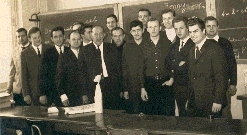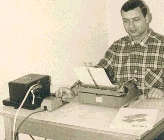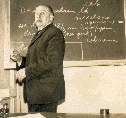Marine-School: Radio Operator
2nd Class
My development as radio operator
unfolded at the Marine School Leer at Ostfriesland, on Bergmannstraße,
and was for 2'nd Class from October 19, 1964 to October 5, 1965, and for
1'st Class from March 15, 1971 to November 30, 1971.
At that time there were
many seafaring schools in West Germany; Flensburg, Lübeck, Hamburg,
Bremen, Elsfleth, and Leer. My choice of Leer was predicated upon
timely course entry at the end of my apprenticeship. I have no regret
in choosing Leer, and can speak of no other city with more pleasure.
|

Left,
that's me. Center radio instructor Janssen.
Notice all the ties in
the room. |
I lived with Frau Margarete
Plack at Mühlenstraße 96, a resolute, 60'ish lady, with many
other boarders from the Maritime school. Shortly after starting school,
I seriously ran out of money, and my father stepped in and paid all the
room and board. I am today very thankful because it was my financial
salvation...
At school, we must at once
our priorities set:
1. Visiting taverns
2. Visiting discos.
3. Meeting young ladies.
4. Visiting auto repair
shops, in case we have an old wreck to drive. |
A typical episode at the end
of the month was the following dialog between my landlady and a colleague
named "Hektor." He visited me shortly before lunchtime, and out of
the kitchen wafted wonderful cooking smells...
Landlady: Well, Herr.
O. what would you like to eat today?
Herr. O.: "Stampfkartoffeln."
(mashed potatoes)
Landlady: Hm, and
what did you eat yesterday?
Landlady: Hm, and
the day before?
Herr. O.: "Pellkartoffeln."
(potatoes in their jackets)
Landlady: And what
do you think you will eat for breakfast?
Herr. O.: "Salzkartoffeln."
(seasoned potatoes)
That was the breakthrough!
My landlady spontaneously invited him for lunch. Hektor was a very lucky
man.
|

The author
practicing on the ink-well tape printer. The use of the typewriter
is unknown.
|
At school there were experienced
seamen at the height of their careers, and were, naturally, qualified as
Radio Officers. We had, actually, a good understanding of our colleagues,
but often saw ourselves as unqualified Landlubbers. They had a minimum
of three years of sea-time under their belts. Our instructors were "Joke"
Janssen, and Harm Hasbargen, and later came Hanswerner Grums.
The test speed for Radio
Officer 2'nd Class was 90 characters per minute (18 wpm) for character
groups, and 120 characters per minute (24 wpm) for text, for five minutes,
naturally without error. Transmitting, three errors were permitted. |
In the beginning, when we could
copy 40-50 characters per minute, (8-10 wpm) and only then could we transmit.
Learning to copy was from
tapes with various texts and speeds, and sending practice was with the
ink-well tape printer - naturally without any sidetone. When our instructor, "Joke"
Janssen, "let us have it," he sent clear text by hand faster and faster
'till our failure rate was 100%, and we gave up.
|

Radio
instructor Janssen at the lesson "Telegram Format". |
. |
On English instruction,
I can remember very well the much beloved English handbook, "Handbook for
Radio Operators," which in time I nearly completely translated.
On the semester holiday,
I worked as Assistant Electrician on a small freighter. More on that
in "Sea-Time." For training,
after six months we visited the coastal radio station Norddeich Radio.
The receiving installation was in Utlandshörn, and the transmitting
installation in Norddeich. The Discone, Prism, and Beverage antennas
were very impressive. The culmination of the trip was listening in
on communications with a ship, and I must say , I could hardly copy anything.
The speed was much too fast for us. The radio operator saw us as
men from another star. I never even dreamed that I would later work
as radio operator at Norddeich Radio. In October 1965 we took our
test with Postoberamtmann (Supervisor) Schultz from the Oberpostdirection
Bremen. Then we celebrated in the "Kleine Möve", (Little Seagull)
a tavern near the school that all the students naturally gravitated to. Now began "Serious Life."
I hired with the shipping firm Heinrich C. Horn, a subsidiary of "Hamburg-Süd".
More under "Sea-Time." |


